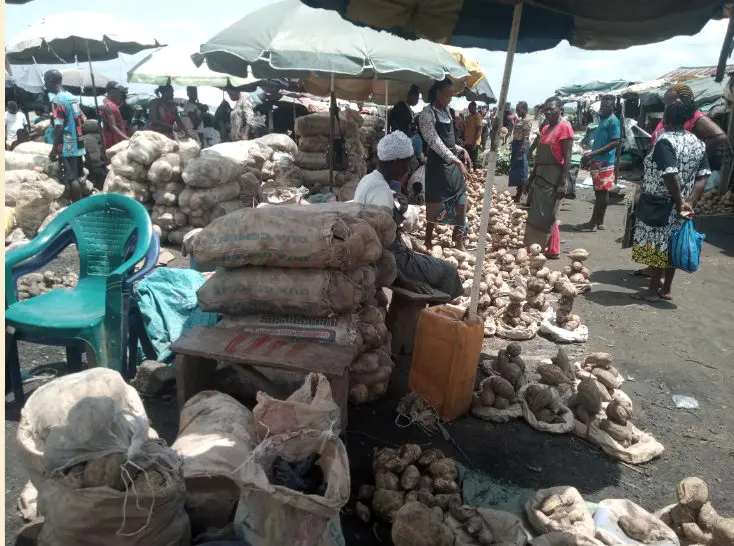Nigerian traders are raising concerns about the steep rise in food prices, pointing to widespread insecurity as a major factor driving up costs. As food prices continue to soar, many Nigerians are struggling with the impact of inflation on essential goods, which has been compounded by security challenges across the country. Farmers, traders, and consumers alike are feeling the pressure as insecurity disrupts agricultural activities and transportation, ultimately affecting the availability and affordability of staple foods.
Over recent months, markets in Nigeria have seen a significant increase in the prices of essential food items, such as rice, beans, tomatoes, and maize. According to traders, insecurity in key agricultural regions has made it difficult for farmers to grow and harvest crops safely, leading to a decline in supply and subsequent price hikes. “We’ve seen prices go up by as much as 40% on some items, and it’s largely because farmers can’t operate freely,” said one market vendor in Lagos. “The threat of attacks has forced many to abandon their fields or reduce their production.
In regions like the North-East and North-West, frequent conflicts and bandit attacks have made farming extremely hazardous. These areas, traditionally known as Nigeria’s agricultural hubs, have faced a wave of kidnappings, armed robberies, and violence that has displaced communities and kept many farmers from tending to their land. The implications are widespread, as disruptions to farming create shortages of produce that ripple through the supply chain, impacting food availability nationwide.
Traders blame high cost of food items
Transportation of goods is also increasingly risky, with traders citing roadblocks, ambushes, and high security fees as reasons for soaring transport costs. Farmers and distributors have to navigate through unsafe routes, where they risk being targeted by armed groups. To cover these risks, traders are left with little choice but to raise prices, passing the burden onto consumers. “We are paying more to get our goods to market. It’s not safe to travel anymore without worrying about being attacked or losing everything,” explained a wholesale trader in Kano.
Analysts have noted that these security issues are particularly problematic for rural communities, where the majority of farmers reside and where poverty rates are highest. Insecure conditions have forced many farmers to either abandon their livelihoods or limit production, exacerbating poverty and food scarcity in already vulnerable areas. According to the World Bank, Nigeria’s inflation rates remain high, with food inflation surpassing general inflation. While other factors, such as global supply chain disruptions and rising fuel costs, also play a role, local insecurity is seen as the primary factor that sets Nigeria apart from neighboring countries facing similar global pressures.
In response, some farmers have tried to adapt by relocating to safer areas or diversifying their crops to reduce losses. However, these measures are only temporary solutions, and farmers say that lasting change will require a stronger government response to security threats. Many are calling on the government to take immediate action to address insecurity, arguing that until the safety of farmers and transport routes is guaranteed, food prices will continue to remain high.
Government officials have acknowledged the security challenges facing the agricultural sector and have made several attempts to increase military presence in affected areas. Additionally, authorities are working to implement initiatives aimed at promoting agriculture, such as subsidies for farm equipment and the introduction of security measures to protect farmers and traders. However, critics argue that these efforts have yet to yield tangible results, as insecurity continues to disrupt food supply chains and strain the economy.
The impact of rising food prices has been felt across Nigeria, especially among low-income households that are finding it increasingly difficult to afford basic necessities. Consumers are adjusting by purchasing smaller quantities, opting for lower-cost alternatives, or even skipping meals altogether. “We have no choice but to buy less,” said one shopper in Abuja. “Everything is expensive now, and our salaries haven’t increased to match the prices.”
In the long term, experts warn that if the insecurity crisis is not addressed, Nigeria could face severe food insecurity, with even higher prices and potential shortages of key items. They stress the need for an urgent, comprehensive approach to tackling insecurity in agricultural zones, including enhanced policing, community engagement, and partnerships with local leaders to promote stability.
In summary, traders across Nigeria continue to link high food prices to widespread insecurity, which has disrupted farming, reduced crop output, and raised transport costs. As food prices surge, the call for action grows louder, with Nigerians urging the government to ensure the safety of farmers and protect the country’s agricultural backbone.
Source: Dailpost
In other news -Nigeria Needs Over N19 Trillion to Complete Inherited Road Projects, Says Minister David Umahi
The Nigerian government faces a daunting financial challenge in its quest to complete numerous road projects inherited from past administrations, according to Works Minister David Umahi.
Speaking at a recent press briefing, Umahi revealed that the country needs more than N19 trillion to finish these projects, highlighting the significant financial strain and infrastructural backlog that the government must address. Read more



